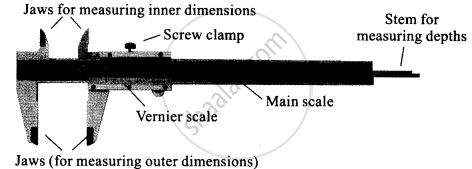Advertisements
Advertisements
Question
The vernier scale of a travelling microscope has 50 divisions which coincide with 49 main scale divisions. If each main scale division is 0.5 mm, calculate the minimum inaccuracy in the measurement of distance.
Solution
A Diagram of the vernier calliper is shown below.

According to the problem, 50 divisions of the Vernier scale coincide with 49 main scale divisions.
50 VSD = 49 MSD
⇒ 1 MSD = `50/49` VSD or 1 VSD = `49/50` MSD
Where MSD = Main scale division and VSD = Vernier scale division.
We know that
Minimum inaccuracy = Vernier constant
= 1 MSD – 1 VSD
= 1 MSD – `49/50` MSD = `1/50` MSD
It is given in the problem that 1 MSD = 0.5 mm
Hence, minimum inaccuracy = `1/50 xx 0.5` mm = `1/100` = 0.01 mm
APPEARS IN
RELATED QUESTIONS
The error in the measurement of the sides of a rectangle is 1%. The error in the measurement of its area is ______.
Define absolute error.
If the measured values of the two quantities are A ± ΔA and B ± ΔB, ΔA and ΔB being the mean absolute errors. What is the maximum possible error in A ± B? Show that if Z = `"A"/"B"`
`(Delta "Z")/"Z" = (Delta "A")/"A" + (Delta "B")/"B"`
In Ohm’s experiments, the values of the unknown resistances were found to be 6.12 Ω, 6.09 Ω, 6.22 Ω, 6.15 Ω. Calculate the (mean) absolute error, relative error, and percentage error in these measurements.
Solve the numerical example.
If the length of a cylinder is l = (4.00 ± 0.001) cm, radius r = (0.0250 ± 0.001) cm and mass m = (6.25 ± 0.01) g. Calculate the percentage error in the determination of density.
Solve the numerical example.
If the formula for a physical quantity is X = `("a"^4"b"^3)/("c"^(1//3)"d"^(1//2))` and if the percentage error in the measurements of a, b, c and d are 2%, 3%, 3% and 4% respectively. Calculate percentage error in X.
The relative density of a metal may be found by hanging a block of the metal from a spring balance and nothing that in air, the balance reads (5 .00 ± 0.05)N while in water, it reads (4.00 ± 0.05)N. The relative density would be quoted as ______.
The mean length of an object is 5 cm. Which of the following measurements is most accurate?
A physical quantity X is related to four measurable quantities a, b, c and d as follows: X = a2 b3 c5/2d–2. The percentage error in the measurement of a, b, c and d are 1%, 2%, 3% and 4%, respectively. What is the percentage error in quantity X? If the value of X calculated on the basis of the above relation is 2.763, to what value should you round off the result.
If the zero of the vernier lies on the right-hand side and the fourth division coincides with the main scale division when the jaws are in contact so the correction will be ______.
